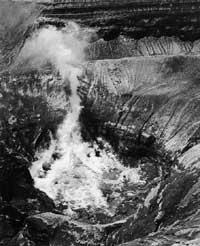Denouncing Dust
The study of volcanic dust and ashes deposited at the bottom of the African Oceans by the wind has allowed paleoclimatologists to clarify the climate changes that have occurred in this continent over the last five million years. The geological data provided by the sediment layers of the ocean floor have provided very precise information on climate variations, with a possible error in dating between 10-20,000 years.
So far scientists have established the relations of climate evolution with paleontological data only for a period of between 3.5 and 4 million years. The next season is the most interesting of our evolution, but so far only hypotheses have been made. Now things are clearer.

Five or six million years ago, at the end of the Miocene, the climate cooled and dried, replacing rainforests with savannah in Africa. In that jungle retreat, a sort of monkey that lived at least in the branches of the trees learned to live in a savannah with scattered trees. This ancestor of the australopithecus and hominids tended to walk on the two legs.
Every time later, until about three million years ago, warm and humid climates alternated with dry and cold ones. As a result, tree savannas expanded and decreased respectively. Some of the Australopithecans were isolated in forest areas and others occupied the nearby meadows. Finally, during the intense cold that occurred 2.8 million years ago two large branches of hominid were formed.
Over the next thousands of years, a branch of hominid became vegetarian on the banks of the savannah rivers. In the dry swamp, these so-called “strong” australopitheces, had to eat seeds and tubers. The hominids of the other group were lighter and colonized the different habitats. They ate all kinds of food, including meat. Thanks to this system, they could buy food at any time of the year. Then, after the most “intelligent” elements and the strongest brains are imposed by selection, the first Homos appeared.
The “forts” of Australopit were destroyed about a million years ago and Homo erectus began to conquer the world leaving Africa.





